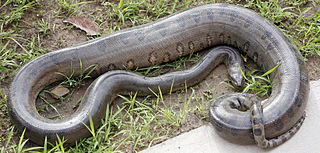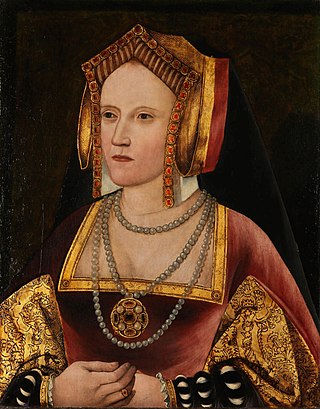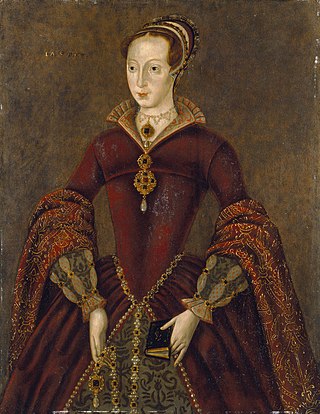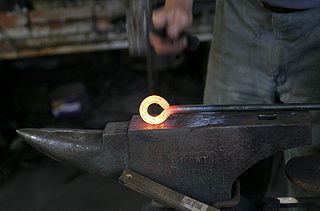Henry Johns may refer to:
- Henry H. Johns, American politician
- Henry T. Johns (1828–1906), Union Army soldier and Medal of Honor recipient
- Henry Van Dyke Johns (1803–1859), Episcopal clergyman
Henry Johns may refer to:

Anacondas or water boas are a group of large snakes of the genus Eunectes. They are found in tropical South America. Four species are currently recognized.

Catherine of Aragon was Queen of England as the first wife of King Henry VIII from their marriage on 11 June 1509 until their annulment on 23 May 1533. Born in Spain, she was Princess of Wales while married to Henry's elder brother, Arthur, Prince of Wales, for a short period before his death.
John Nash may refer to:

Anne Boleyn was Queen of England from 1533 to 1536, as the second wife of King Henry VIII. The circumstances of her marriage and of her execution by beheading for treason and other charges made her a key figure in the political and religious upheaval that marked the start of the English Reformation. Anne was the daughter of Thomas Boleyn, 1st Earl of Wiltshire, and his wife, Elizabeth Howard, and was educated in the Netherlands and France, largely as a maid of honour to Queen Claude of France. Anne returned to England in early 1522, to marry her Irish cousin James Butler, 9th Earl of Ormond; the marriage plans were broken off, and instead, she secured a post at court as maid of honour to Henry VIII's wife, Catherine of Aragon.
John or Jack Henry may refer to:

Prince Henry, Duke of Gloucester, was the third son and fourth child of King George V and Queen Mary. He served as Governor-General of Australia from 1945 to 1947, the only member of the British royal family to hold the post.

John Henry is an American folk hero. An African American freedman, he is said to have worked as a "steel-driving man"—a man tasked with hammering a steel drill into rock to make holes for explosives to blast the rock in constructing a railroad tunnel.
Bastard may refer to:

"Greensleeves" is a traditional English folk song. A broadside ballad by the name "A Newe Northen Dittye of ye Ladye Greene Sleves" was registered by Richard Jones at the London Stationer's Company in September 1580, and the tune is found in several late-16th-century and early-17th-century sources, such as Ballet's MS Lute Book and Het Luitboek van Thysius, as well as various manuscripts preserved in the Seeley Historical Library in the University of Cambridge.

Baron Jeffreys is a title that has been created twice, once in the Peerage of England and once in the Peerage of the United Kingdom. The first creation came in the Peerage of England on 16 May 1685 when the lawyer and later Lord Chancellor, Sir George Jeffreys, 1st Baronet, was made Baron Jeffreys, of Wem. He had already been created a Baronet, of Bulstrode in the County of Buckingham, in the Baronetage of England in 1681. The titles became extinct on the death of his son, the second Baron, in 1702, who had no male heir: his daughter, the writer Henrietta Fermor, married the 1st Earl of Pomfret. The estates passed to Jeffreys' widow, Lady Charlotte Herbert, who later remarried as Viscountess Windsor.
Steel, in comics, may refer to one of several DC Comics characters:
John Patterson may refer to:
John Newman may refer to:

In common parlance, the wives of Henry VIII were the six queen consorts of King Henry VIII of England between 1509 and his death in 1547. In legal terms, Henry had only three wives, because three of his marriages were annulled by the Church of England. However, he was never granted an annulment by the Pope, as he desired, for Catherine of Aragon, his first wife. Annulments declare that a true marriage never took place, unlike a divorce, in which a married couple end their union. Along with his six wives, Henry took several mistresses.

Lady Jane Grey, later known as Lady Jane Dudley and as the "Nine Days' Queen", was an English noblewoman who claimed the throne of England and Ireland from 10 July until 19 July 1553.

A mistress is a woman who is in a relatively long-term sexual and romantic relationship with someone who is married to a different person.
Shrapnel may refer to:

Smyth is an early variant of the common surname Smith commonly found in Ireland. Shown below are notable people who share the surname "Smyth".
Coyne is a surname of Irish origin anglicised from the Gaelic Ó Cadhain meaning "descendant of Cadhan".
In Greek mythology, Aconteus may refer to the following distinct two individuals: